Israel Talks – The Salad Trail
On a small Moshav just west of Beer Sheva, David Ben Gurion’s dream came to life. After his political career ended, he moved to Kibbutz Sde Boker, a small kibbutz in the center of the Negev, fulfilling his life goal of making “The Negev Bloom”.
The Salad Trail does just that. While the Moshav is located in the middle of the desert, they have countless fruits, vegetables, and herbs blooming all year round. The Salad Trail is mainly used as an educational experience, and offer tours every day (except Shabbat) for small or large groups. During the tour, you are able to pick any fruit or veggie you can imagine – plucking tomatoes off the vines, pulling carrots out of the ground, and picking fresh mint off the plant.
The food in and of itself is enough of a reason to head down south to the trail, but the knowledge passed on from guides about how they are able to grow so much produce in the middle of a desert makes the experience that much more captivating.
For more information about The Salad Trail and its tours, head to their website https://www.salat4u.co.il/%D7%90%D7%A0%D7%92%D7%9C%D7%99%D7%AA
Israel Talks – Drafting into the IDF
The process of drafting into the IDF differs for everyone. For some, the process starts when you are 16 years old and in high school, with years to do the testing and interviewing required for different positions. For me, it started just four months before I was on the bus headed to my base. That’s because the program I participated in, Garin Tzabar, works with the IDF to expedite this process.
The process, however, starts the same for everyone. It starts with a letter in the mail called “Tzav Rishon,” or first call up. On this letter, it tells you what date, time, and location your testing begins. The first four tests are also the same for everyone – a personal history, logic, Hebrew, and physical test.
For the personal history test, which I wouldn’t necessarily classify as a test, you sit in a room with a soldier and go over basically your life story – age, level of education, socioeconomic status, relationship with parents, etc. This is used to determine different rights you may be eligible for or different positions for which you can qualify. This is scored out of 90, decreasing by intervals of 10.
The logic test is just as it sounds – you have 25 minutes to answer 61 logic questions in the language of your choice. The highest score you can receive on this test is a 56, decreasing by ones.
The Hebrew test is scored out of 9, and you have reading, writing, speaking, and comprehension assessments. This test is done one on one with a soldier who prompts you to do all the different tasks. If you score below a 6 on this test, you are required to attend an Army Ulpan for the first three months of your service at a base in the north called Michve Alon.
Lastly, is the physical test. This is not a test to see how fast you can run or how many pushups you can do, but more to see what the of state your body is. It is basically like a normal physical that you get every year, adding health history. The scores here are 97, 82, 72, 64, 45, 35, 31 (the lowest profile score that is still fit to serve), 24, and 21 (exempt from mandatory service but able to volunteer). You get the scores back from the Tzav Rishon only a few days later online.
The next step is the Tzav Shini (second call). Here, depending on your first set of scores and what gender you are, you move onto the next set of testing. For women, there is a day called “Yom Ha’meah” in which you are tested on technical skills, instructing skills, human relation skills, team work abilities, data processing, and management capabilities. From there, you are given a “manilla” with all the possible job opportunities available to you. Next, you are invited for interviews based on the jobs your manilla offers, in order to see if you are truly a good fit for a specific role. Then it becomes sort of like a matching process; you tell the army which jobs you want and they try to match you up to the best of their ability. Girls drafting to combat also participate in “Yom HaMeah,” but on their manilla, they are given a list of different combat units they can draft into too. They are able to compete in what’s called a gibbush (more to come) in order to join the more elite units available for women.
Men take a completely different route. Men are given a list of different units they can draft into, and are more or less able to choose which combat unit they prefer. If you are not drafting into a combat unit, the process is similar to that of the women, where you have a multitude of interviews to see what job you would do best in. If you are eligible (aka score high enough on all the tests during Tzav Rishon), you are invited to a day called “Yom Sayerot” (day of elite units). This is the day where you show off your physical abilities, and based on how you do here, you can get invited to further gibbushim.
A gibbush is essentially a very intense physical try out – it can last anywhere from a few hours to several days. Generally, the gibbushim occur after you draft, and if you pass, you would transfer units. Some gibbushim require an invitation (for the top tier elite units), while others anyone in that unit can attend. Each unit has its own selection of elite units, and then there are special units that are separate entities. Gibbushim are complicated though – you can get kicked out or quit at any time throughout the whole try out, or you can finish the entire thing, but still not pass. The criteria they score you on is not well known, but even if you don’t technically pass it, you can still get into an elite unit, you would just not be eligible for super elite units like Sayeret Matkal or Shayetet 13.
Like I said, the process is different for everyone, but one thing remains the same – it’s never easy. The whole process for me was extremely difficult. During my Tzav Rishon, I really wanted to pass out of the Army Ulpan requirement, something you can only do by scoring a 6 or higher on the Hebrew test. I scored exactly a 6, and at first was very excited I didn’t have to do the ulpan, but as it got closer to draft time, I realized my Hebrew level wasn’t good enough to be able to successfully complete my training. This then led to weeks of phone calls with officers and civilians who had pull in the army, talks with staff members of Garin Tzabar, and multiple interviews with high ranking officers to see if I would be able to attend the ulpan, even though my Hebrew score said I didn’t need it. In the end, I was told no, I could not attend the ulpan because they thought my Hebrew would improve more by being surrounded by Israelis than being surrounded by others who also weren’t great at Hebrew.
In addition to that, I was not super thrilled about the first job assigned to me. My manilla offered many good jobs that I was very interested in, roles I would be extremely happy to have throughout my service. However, the matching process did not sway in my favor, and I was told I received a job I really didn’t want. Luckily, the program I was a part of, Garin Tzabar (more info on last week’s blog post), had a lot of pull with them army, and they were able to get me my top choice of jobs!
Next week’s post will be more about the army and what day to day life is like. If you have questions you want answered about what army life is like, or general questions about being a soldier, send me an email at marti.hmdetroit@gmail.com and I’ll be sure to answer them in the next post!
Israel Talks – Tzofim Garin Tzabar
Were you ever interested in joining the Israeli Defense Forces (IDF), but didn’t know where to start? Nervous that you wouldn’t know have a support system while making Aliyah? Worried that you wouldn’t have friends or a family helping you through this big change in your life? If you answered yes to these questions, Tzofim Garin Tzabar is your solution.
Garin Tzabar is an army absorption program helping young adults from all over the world make Aliyah and join the IDF. It starts in or near your home town, with 4 seminars providing information about the army and Israel, and building relationships with people who are in the same boat. You attend the seminars with your Garin, in Hebrew meaning “seed” or “core”, but in this context, these are the people you will be living with when you move to Israel. The Garinim are generally based on where you live in the states, but there are many other, more specific, Garinim to join, including a religious Garin or an after-college one too. They have more than 5,000 alumni, with over 400 new participants making Aliyah and drafting every year. This is the program I participated in when I made Aliyah. I was part of the Mid-West Garin, and we met each of the four times in the outskirts of Chicago.
Garin Tzabar offers a “Pre-Ulpan” for participants who need a little extra Hebrew help (which I very much so needed), which starts in late June. This program is offered to all members of Garin Tzabar, and was a great way to meet participants from other Garinim, get acclimated to Israel, and start the bureaucracy process. After the month and a half Pre-Ulpan session, we split up into our respective garinim, and move either to a kibbutz or a New Immigrant Absorption Center all throughout the country for what’s called the Absorption Period.
I lived on Kibbutz Lahav, a kibbutz in the northern region of the Negev. During the Absorption Period, we learned all about the army (units, beret colors, different positions, ranks, etc.), our rights as Lone Soldiers (soldiers who do not have financial or emotional support from their parents, or soldiers whose parents live in a different country), and work on improving our Hebrew proficiency through an intensive 3 month Ulpan.
While on the kibbutz, you are assigned a roommate from your garin in “Beti Hachailiim” (soldier houses). Additionally, you are placed with a host family, either alone or with another member of your garin. My host family truly became like my second family, we celebrated every single Shabbat together, I went with them for all the holidays, they came with me to my draft day and all of my army ceremonies, and even met my family and friends when they came to visit. Having a second family really made my experience in Israel so special, I was never alone on holidays, I had a support system all throughout my service, and had three little ones who became my younger siblings.
In addition to all the lessons and activities put on through your garin, the army process also begins at the beginning of the absorption period – more on this next week!
If you have any questions about Garin Tzabar, making Aliyah, or anything Israel related, feel free to contact me at marti.hmdetroit@gmail.com. More info about Garin Tzabar can be found here http://garintzabar.org/.
Tal Talks Israel: Shalva Center
Last May Israel host the Eurovision Song Contest. Above all the good reviews and the professional Israeli production, the highlight of the show was the performance of the Shalva Band.
“Shalva” is the Israel Association for Care and Inclusion of Persons with Disabilities. They provide an all-encompassing range of services for thousands of people with disabilities from infancy to adulthood and their families. Shalva’s comprehensive life-cycle programming provide leading-edge therapies, inclusive educational frameworks, social, recreational activities, employment training, independent living, and family support.
Part of the Shalva Center is the Shalva Band who is comprised of 8 talented musicians with disabilities who perform to the highest musical standards. They can be seen at cultural venues and dignitary events throughout the year. Their music inspires crowds with its musical repertoire and charm, as they are one of Shalva’s most celebrated inclusion programs.

The band members are employed by Shalva as musicians and they also study, work, and volunteer in the broader community. In addition to being a delightful and inspiring musical experience, the band’s performances shatters misconceptions about their community, causing mesmerized audiences to believe in human potential and dignity.
Tal Talk’s Israel: Lady with Baskets” (“Gveret Im Salim”)
Between Jaffa and Agripas street in Jerusalem there is the famous shuk “Mahane Yehuda market”.The market, which began operating in the 19th century, has always been the central food market for the city’s residents.
Last year, I lived in the Nachlaot area which is really close to Mahane Yehuda market and it was one of my favorite places to hang out with friends. Every weekend, especially on Thursday and Friday, the atmosphere starts to change as people come to shop in preparation for Shabbat. Throughout the crowd, you see young people wearing yellow T-shirts. They are volunteers who help older people carry their baskets home.
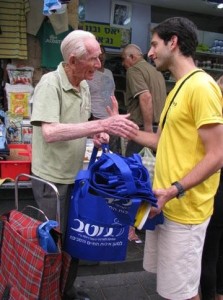
This project was founded by Yakir Partush, a student in Jerusalem. He had the idea to start this unique volunteer opportunity when he offered an elderly women help carrying her bags home. Even for him, her bags were heavy and when he asked her why she didn’t ask for help, she told him: “she wasn’t comfortable asking for help from people who were rushing home for Shabbat”.
The project has continued to grow. Every Thursday you can see the magic of the volunteers giving back and doing good work as they help the seniors carry their shopping bags home. In turn, the volunteers enjoy hearing life stories and having memorable intergenerational experiences.
Want to see more? Click here to watch the full video about the amazing activity.
https://www.youtube.com/watch?v=mnd5tknMuRg&feature=youtu.be
Here’s another ethical issue and Jewish source response:
Case
In Dante’s Peak (whether you saw it or not) there is a great ethical dilemma. Grandma lives up on the mountain. She is warned about the volcano erupting and refuses to come down. The adults, knowing the danger, are really frustrated but know that it is too late to go get her. The kids cry and complain, but the adults explain the situation. Then, while the adults are busy doing other necessary things, the twelve-year-old boy and the ten-year-old girl steal Mom’s truck and head up the mountain toward the erupting volcano to save Grandma.
Answer
Dante’s Peak suggests the question, “Can two kids try to outrun the lava in order to rescue their grandmother?
[a] Jewish law draws a distinction between safek sakaneh (possible danger) and vadai sakaneh (certain danger). Maimonides teaches: “One may risk safek sakaneh in order to save another person, but not vadai sakaneh (Kesef Mishneh).
[b] This idea is rooted in Leviticus 18:5: “You shall keep My laws and My rules, you shall act on them, You shall live by them.” The idea is that no mitzvah is worth dying for (except the three: not murdering, not sexually assaulting and not committing public adultery).
[c] The problem in the film is that the kids believe that the rescue is possible, the mother and the other adults that it is impossible, Normally the adults would win because of the commandment of Honor your Father and Mother. However, Rashi on Leviticus 19:2 makes it clear that you need not obey your parents when they ask you to violate the Torah. (Not saving a life when possible would be a Torah violation.) So it all boils down to how sure the kids are that the life is savable.
Joel Grishaver, “You Be the Judge”, pgs. 51-52
Used with permission from Joel Grishaver
Tal talks Israel: Hadassa Hospital
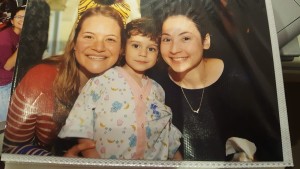
Imagine a school that has no bells, no tests, and attending class is optional.
At Hadassah Ein Karem Hospital in Jerusalem there is special school that called ”Kitat Yiladim” for those children that are dealing with long term hospitalization and can’t attend a regular school. The education staff, welcome the sick children every day and teach them in multidisciplinary, creative and innovative ways.
Hadassah School is a multicultural enviroment. The population of children includes religious and non-religious Jews, Muslim, Christian Arabs, and new immigrants. The staff is also multicultural, and the school activities are in both Hebrew and Arabic.
My sister, Yael did her national service at Hadassa school and she said “this is why the sick children love to go to school, even if they don’t have to. The school offers an opportunity for children to meet other sick children in the same situation as them, but more then anything else, you can see them meeting between the cultures and connecting through sharing stories.”
Yael works with a lot of volunteers in the play area, waiting rooms and the wards themselves to help the children get through their hospital stay as pleasantly as possible. The children and the family get a lot of warmth and love, which helps them deal with their hospitalization, sickness and pain.
Tal Talk’s Israel – Or Yarok (Green Light) is an organization dedicated to reducing road accidents.
Can you imagine that in Israel the weather is around 84 F right now?
Last week, here in Michigan, I experienced my very first snow storm.
I was super excited to see everything covered with white snow but at the same time I was worried about driving in it for the first time and had to be really careful!
In Israel, more than 30,000 people are injured in road accidents every year.
Or Yarok is an amazing nonprofit organization with the mission to reduce road accidents in Israel through education, enforcement and improved infrastructure.
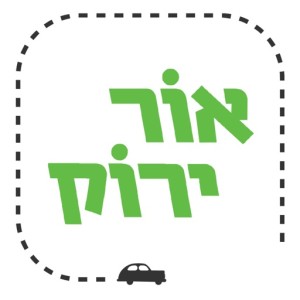
Or Yarok was established by Avi Naor after his son, Ran Naor was killed in a car accident when he was only 19. In honor of his social activity, Naor received a lifetime achievement award from the Israeli president. Today, more than 5,000 national volunteers take part in this organization and conducts a series of programs intended to improve Israeli driving culture.
Tal talk’s Israel – Mabrooc Project: Wedding events become affordable for everyone.
Wedding celebrations are a very exciting, special and joyful event for any young couple. But they also can be expensive and unaffordable.
Last year, I volunteered for the Mabrooc Project that promotes mutual responsibility and solidarity of the Israeli society through volunteering. The project is manned by students and enables young couples who have contributed to the community and state get help financing their wedding.
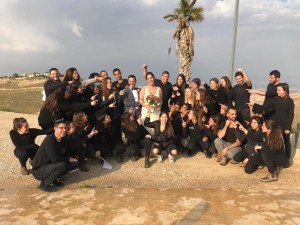
Wedding vendors provide their services free of charge (wedding venues, DJ’s, wedding dress designers, etc).
Moreover, the project recruits random students volunteers to staff (servers, bartenders, etc.) for the wedding event.. After the wedding, the couple joins the Mabrooc family and volunteer for future events, thus spreading the word of volunteerism.
For me, the Mabrooc project is a special organization that truly makes dreams come true. This is the place that embraces all of Israel society to meet, talk and work together for the same special reason.

Last year I volunteered for the Mabrooc project in Jerusalem and we produced six weddings for amazing couples. More than 400 people volunteers have been recruited.
 The thing that I like about Mabrooc is that anything can happen! Mabrooc can become a magic cure that unites and connects Israel society. More than anything else, Mabrooc is an opportunity to do good and to meet incredible people that open their hearts for other people that they do not know.
The thing that I like about Mabrooc is that anything can happen! Mabrooc can become a magic cure that unites and connects Israel society. More than anything else, Mabrooc is an opportunity to do good and to meet incredible people that open their hearts for other people that they do not know.
Click here and see more about Mabrooc.
Tal Talks Israel – First Hug Association
Studies from all over the world have proven that daily contact is essential for the healthy cognitive development of babies. Let’s hear about an Israeli organization that understands how important hugs and physical contact is for an infant to build a sense of security at the start of a child’s life.
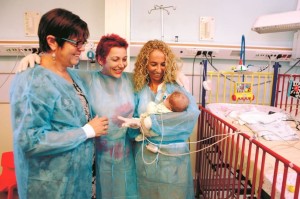
The First Hug association aims to care for every abandoned and lonely baby in the hospitals of Israel. They are committed to filling the void created by the absence of a mother and father, and provide the emotional and cognitive needs that are so crucial for a baby’s proper development.
The medical staff assigned to such highly populated nurseries care for the babies’ health and physical needs, but due to the enormous daily workload, cannot care for the babies’ emotional needs. This is why First Hug was born.
Currently, the First Hug Association has an array of approximately 500 volunteers who care for the lonely and abandoned babies in all the hospitals in which the association operates. The First Hug volunteers come and care for the babies each and every day, filling the void created by the absence of a parent. With grace and kindness, they provide the abandoned babies with the soft touch, caresses, warmth, and love that they need in the first months of their lives.
